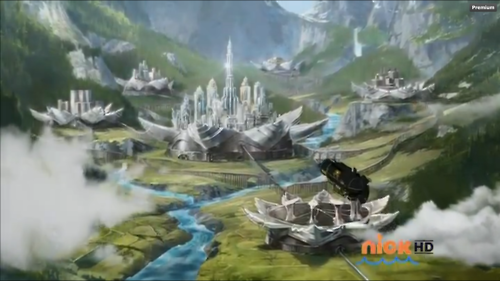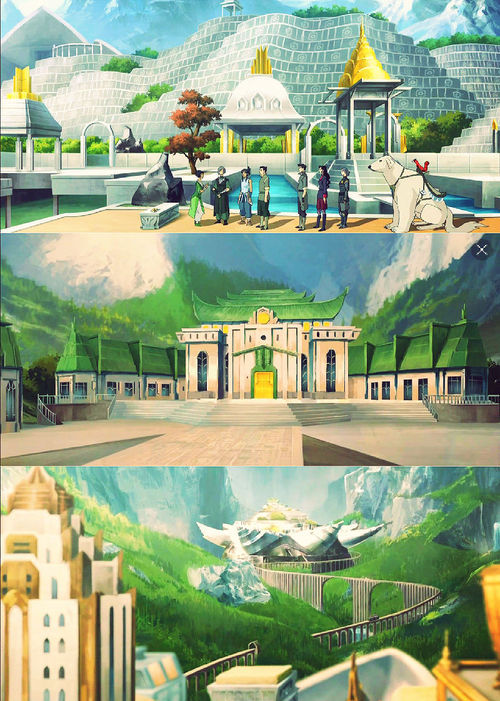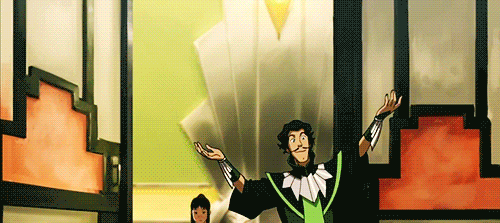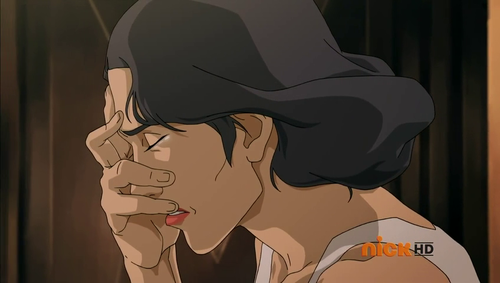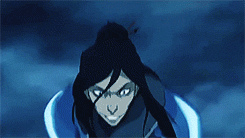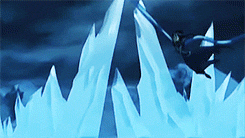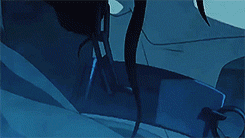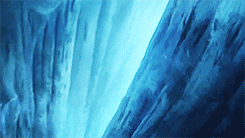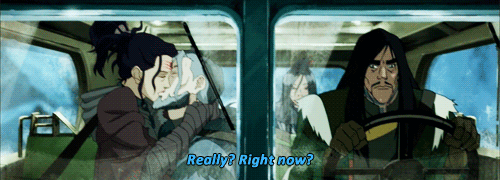I still can’t get my head around the airing of these episodes (lengthy gaps followed by two back-to-back episodes...huh?) and I can only assume it’s a consequence of the leak, but hey – if it means that I have to wait longer for double the episodes then I guess it all pans out.
Five episodes in and the structure of this season is becoming clear: the Avatar team will traverse the world in search of new air-benders (providing little mini-arcs in each new location) whilst the over-arching storyline of the escaped prisoners and their interest in Korra will eventually unify the episodes.
It’s a sensible choice, for a large part of the appeal of the original Avatar: The Last Airbender was its world-building, in which the beautiful animation showcased a variety of cities, terrains and landscapes. To revisit the same world a few generations later gives the creators the opportunity to showcase both old and new locations: here Jinora explores the catacombs under Lake Laogai, finding that the tunnels are now flooded, which serves as a stark contrast to the shining city of Laofu, populated by metal benders that have structured it to resemble a bed of lotus blossoms.
But perhaps the best idea this show has had is to finally drop the tedious love triangle, focusing instead on the dynamics of Mako/Bolin as brothers and Asami/Korra as girlfriends. The real irony of all this is that I’m certain the initial love triangle was born out of Bryke’s awareness of the shipping wars of the original show, and designed as an attempt to give the fandom what they thought it wanted.
It really didn’t work.
But though I would always caution any writer/artist/creator against bowing to the demands of their fan-base, I think that this newfound focus on the girls (and giving Asami considerably more air-time) is one of their smartest decisions. Even now and then a fandom means it when they say "more girls", and it would appear that the creators were listening.
After a bit of astral project courtesy of Jinora (which actually reminded me of Samara from The Ring what with the way she fizzed in and out of focus), the air-benders are found and a rescue mission is launched. Though I call foul at Tenzin allowing Jinora to race off with Mako and Bolin to find Kai, everyone manages to escape safely – there’s even time for a quick political quandary about what exactly is legal in this situation.
According to the Earth Queen, the new air-benders are Earth Kingdom citizens, and therefore she has every right to conscript them into her army. To Korra and Tenzin, they are newly-born air-benders and have a duty to accompany them to the Northern Air Temple to begin training.
So which are they? Earth Kingdom citizens or Air Nomads?
Tenzin ultimately offers them the choice to stay where they are or go with him (a much better tactic than trying to lure them in with the perks of a monkish lifestyle), and it turns out that free choice trumps patriotic duty. Naturally they decide to go with him to the temple – only for the A-plot to arrive in the form of Lin, bearing news of the escaped prisoners and insisting that Korra return to Republic City for her own protection.
As is Korra's way, she refuses, for they've just had word of a new air-bender in the city of Laofu. Indeed, there seems to be an influx of both air-benders and female characters of late, not just in the reintroduction of Lin Bei Fong, but in the first appearance of her extensive extended family.
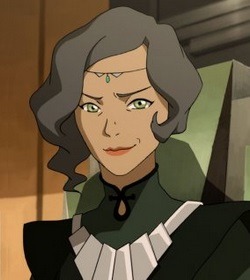 |
| Suyin: the half-sister you never knew Lin had |
It's at this point we learn the rather astounding news that Lin not only has a sister called Suyin (whose daughter is the very air-bender that the team has come to find), but that Toph a) is still alive and apparently wandering the world on a quest for enlightenment, and that b) her daughters have different fathers – men that Toph presumably didn’t marry.
Wow, let’s just let that sink in for a minute.
It’s always a risk bringing in long lost relations (see Robin Hood and Merlin for how not to do it), but in this case at least you could argue there’s a reason for it, as Lin is highly reluctant to associate with her sister and her family. As yet, the question still remains as to why.
Because of the dual-airing of these two episodes, you can’t help but hold up Suyin as a comparison to Hou-Ting. Introduced as “the matriarch of the Metal Clan” as opposed to any sort of Metal Queen, Suyin has a low opinion of royalty, employs ex-convicts on her staff, and tolerates no secretive business in her city – Lin’s presence in Laofu is quickly exposed thanks to her associate Aiwei who (like Toph) has the ability to tell if a person is lying.
Whereas Hou-Ting was rounding up air-benders against their will in order to conscript them into a private army (though I’m not sure why she needed such a thing with the Dai Li around), Suyin’s benders are less interested in fighting as they are with dancing, sculpturing and games.
In any other show, a futuristic Utopia such as this would inevitably have a rotten core. We’ve seen this story play out a dozen times – of a serene paradise with a dark secret lurking beneath the surface, where no one pays any attention to the single character who insists that something is wrong. In the interests of avoiding clichés, I sincerely hope that the writers side-step this storyline and simply keep things as pleasant as they appear (though Varrick’s presence doesn’t bode well).
But as difficult as it is to take things in the city at face-value, it would appear that the discord in Laofu is all down to Lin. She begins grows ever-more aggravated the longer she spends with her sister.
Although we get some hints, it’s still not entirely clear what her grievance with Suyin is, but I hope and pray that they’re not going to make this a “bitter old maid” story, what with the “lonely career woman” longing for the life her sister has, complete with husband and children – but surely they know better than that, especially given what we’ve just learnt about Toph.
My personal head-canon surrounding Tenzin and Lin’s breakup was that early on in their relationship, Lin decided that she never wanted children – something that simply wasn’t feasible for Tenzin, who had a responsibility to repopulate the earth with air-benders. No doubt there were other factors at work, but when the relationship ended for good, Tenzin had to quickly find himself a young, fertile wife. None of this is spelt out explicitly in the show itself, but I’ve always felt that this was the implication behind what we learnt about Tenzin and Pema in Book One: Air.
I don’t necessarily want this theory to be canonized in any way, for though I’m happy that Lin is currently getting some spot-light, I’m a little concerned about where they’re going with this – especially regarding Suyin’s speech that what she was looking for was “a family of her own.” Seriously, that life style is not for everyone. If she's a happy career woman then Lin doesn’t have to be envious of either her sister or her ex-boyfriend.
This entire subplot felt a bit like an unnecessary family drama – complete with a barrage of new characters that are going to prove difficult to keep track of – so fingers crossed that it’ll be resolved satisfactorily.
All of which leads us to the very best part of the episodes: the escaped prisoners.
P’Li was sprung by her compatriots despite the efforts of Zuko, the twins, Korra’s father and Zuko’s dragon. The release itself was mainly down to the incredible water-bending abilities of Ming Hwa, and when you watch her, you have to appreciate that she’s doing all her bending with her mind, not with the usual hand/arm actions of other benders. More than that, but she’s apparently strong enough to make water cold and hard enough to easily break through metal.
P’Li ended up a lot taller than I expected, and her reunion with Zaheer (a long passionate kiss) fits in well with what we already know about these prisoners. It's the warmth and camaraderie between the four of them that make them so engaging. So many “villain teams” dislike or even despise each other, but these guys are clearly good friends. Each prison break involves a warm reunion, either with a handshake or a make-out session.
From there, it’s only a quick shave and a haircut before Zaheer heads to Air Temple Island as part of a clever ruse to scope out the territory, integrate himself with the new air-benders and try to figure out the Avatar’s current location.
In another great moment for the women, Kya kicks a fair amount of ass after she figures out exactly who this guy is, and it makes a lot of sense when you consider that she would probably be one of the few benders in the world qualified to take on an air-bender. Their rarity means that their fighting styles would seldom be used in defensive training exercises – but luckily for Kya, she grew up with an air-bender for a brother. Though Zaheer manages to get the upper hand, at least Team Avatar know of his approximate whereabouts.
But for now, their motivation and goals still remain a mystery. Lin tells us that the four of them tried to kidnap Korra when she was just a child, but that in all their years of imprisonment they never once explained why. Yikes – what could be so important that they would endure all that isolation and containment and still not crack? The plot certainly thickens on this front, and suggests the possibility that maybe they’re not as “evil” as everyone seems to think they are.
My theory is that they’re acting on some sort of theological grounds. Zaheer certainly seems to be the type, what with the way he quotes old masters, and there's a significant difference between "kidnapping" a child and "trying to kill" a child. Perhaps they didn't necessarily mean Korra any physical harm, and religious zeal seems to be the theme of all Korra’s villains – let’s just hope that we get more of clearer understanding of these guys than we did for Unalaq and Amon.
The attempted kidnapping also nicely explains just why Korra was kept secluded in a compound for so long – sure, it’s a bit of a retcon, as I’m sure that this particular storyline hadn’t been conceived way back in Book One, but it slides nicely into existing canon. Hopefully a confrontation won’t be too far away.
 One thing that C.S. Lewis is to be commended on is that he never told the same story twice. It’s odd to think it, but only three of the seven Narnia books take place predominantly in Narnia. The others involve other countries across different time periods, with protagonists who had vastly different goals, motivations, and reasons for being there. Adventure stories, quest narratives, rescue missions, fairytales – each book is vastly different in its structure and content, and The Voyage of the Dawn Treader is possibly the most different of all.
One thing that C.S. Lewis is to be commended on is that he never told the same story twice. It’s odd to think it, but only three of the seven Narnia books take place predominantly in Narnia. The others involve other countries across different time periods, with protagonists who had vastly different goals, motivations, and reasons for being there. Adventure stories, quest narratives, rescue missions, fairytales – each book is vastly different in its structure and content, and The Voyage of the Dawn Treader is possibly the most different of all.
















